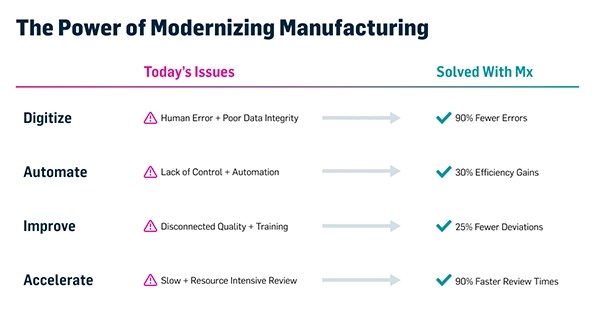Eliminating Errors and Accelerating Production Are Easy When It's Made With MX.
MasterControl Manufacturing Excellence (Mx) is a next-generation digital manufacturing platform that has helped hundreds of manufacturers eliminate millions of errors and deliver products to the market 70% faster.
It’s time to modernize your manufacturing operations –and that means completely paperless manufacturing from production records (EBR/eDHR) and MES to electronic logbooks and asset management – and see how MasterControl Mx can help you run faster, leaner, and smarter.
Demo Manufacturing Excellence
From Startups to Global Leaders



Modern MES For Modern Manufacturing
Modern MES
Manufacturing Execution Simplified
- Rapidly digitize manufacturing processes and procedures with no-code workflows and integrated recipe, formulation, and product family tools.
- Increase flexibility and visibility by automating production processes, orchestrating resources seamlessly, visualizing operations, and unlocking data and valuable insights.
- Connect operations by integrating with systems like ERP, LIMS, and QMS as well as assets like scales scanners, equipment, and IoT devices.
Production Records
EBR and eDHR Made Dynamic
- Digitalize GMP work instructions and embed operator guidance and training, leveraging built-in controls and alerts to eliminate production errors in regulated environments.
- Error-proof life science manufacturing execution with automated data capture, conditional pathing, dynamic process controls, and real-time limits and alerts for batch and device production.
- Accelerate product review and release with automated quality events and resolution, enabling smart, real-time review-by-exception for faster time to market.
Electronic Logbooks
Life Science Logbooks Made Audit Ready
- Simply digitalize equipment and facilities logbooks to ensure GMP compliance and provide real-time visibility into critical activities, conditions, and equipment availability.
- Meet life science regulatory requirements by automating data exchanges, eliminating data integrity issues, and maintaining complete audit trails.
- Seamlessly integrate with MasterControl QMS and MES solutions for connected data flows, real-time status updates, and automated quality workflows in regulated environments.
REGULATED ASSET MANAGEMENT
Asset Management Made Automatic
- Streamline regulated asset management (RAM) with a comprehensive dashboard that shows asset status and includes robust filtering for lifecycle events including maintenance, warranty expirations, and change requests.
- Monitor and track equipment maintenance plans from cleaning protocols to complex multi-step procedures. Trigger events based on time intervals, calendar dates, or usage metrics to align with equipment or regulatory requirements.
- Improve equipment calibration and measurement with advanced features designed for life science compliance. Modern tools ensure accuracy while maintaining secure, traceable data for audits.
Digital Manufacturing Has Never Been Easier
MasterControl Manufacturing Excellence delivers operational improvement at every stage of production – from inbound materials and work orders to batch execution and review-by-exception – quickly and cost effectively so you can gain and sustain a digital advantage.

Get More Out of Your MasterControl Investment
Quality Management
Manufacturing Insights
Manufacturing Integrations
Quality Management

The #1 QMS in Life Sciences
Fully integrate your quality and production systems with MasterControl QMS and MES on the same platform to ensure you are delivering the highest quality products, faster and cheaper.
Manufacturing Insights

Make Better Decisions Faster
Modern analytics and dashboards empower your manufacturing leaders and operators to gain real-time visibility into production status and performance to improve operations and accelerate continuous improvement initiatives.
Manufacturing Integrations

Connect Systems and Equipment
Pre-built connectors and API integrations to manufacturing systems like ERP and LIMS, scales and equipment, IoT devices and sensors, and more.
Additional Resources
MasterControl understands manufacturing. Use our extensive collection of resources to learn about how companies like yours are using MasterControl to come out ahead.
See All Resources